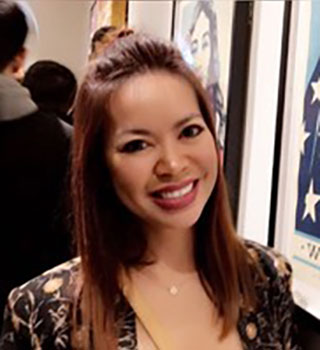Dr. Paraiso: Research Trainee to Project Scientist

Dr. Kim Paraiso began her path to cancer research at Moffitt Cancer Center in 2011 as a Cancer Biology PhD student in the lab of Dr. Keiran Smalley. Dr. Paraiso focused her research on implementing systems-level strategies, particularly utilizing mass spectrometry-based proteomics, to elucidate therapeutic resistance pathways in BRAF and NRAS mutated cutaneous melanomas.
Her research has since translated into integrating high-throughput data to gain insights into tumor progression and vulnerabilities, particularly in cutaneous and uveal melanoma. Dr. Paraiso is now a Project Scientist at the University of California, Los Angeles (UCLA) working in the laboratory of Dr. Thomas Graeber.
Dr. Paraiso says the extensive cancer biology research experience she acquired at Moffitt played a key role in where she is today.
"My contributions to understanding drug resistance and tumor progression mechanisms in melanoma provided a solid foundation for my current research,” she says.
Dr. Paraiso remembers with great fondness the opportunities she had to collaborate with experts in the field, publish in high-impact journals and present at prestigious conferences. The experience at Moffitt led her to gain proficiency in high-throughput data platforms and data analysis techniques, along with various other skills, which in turn set her up to succeed in her new position.
Securing competitive cancer research grants and fellowships at UCLA, contributing to crucial papers in the fields of melanoma differentiation and extrachromosomal DNA, and participating as teaching faculty at the AACR Molecular Biology in Clinical Oncology Workshop are just a few of Dr. Paraiso's many recent accomplishments.
Dr. Paraiso was able to leverage the skills she learned at Moffitt to adapt and transition from wet lab science to master coding. Dr. Paraiso's successful transition into the field of computation was recognized when she received the Computational Mentorship Award from UCLA.
“Working with experts from diverse backgrounds allows for innovative approaches and insights into complex research questions” is how Dr. Paraiso describes her research environment at UCLA. When working in a “rapidly evolving landscape of computational research,” Dr. Paraiso expressed the importance of time management and task prioritization.
Through her extensive experiences in various fields that all land on the foundation of cancer research, Dr. Paraiso has gained wisdom along the way.
Her key points to share with current cancer research trainees include:
- Seek diverse research experiences and collaborations to broaden your skill set and knowledge base. Have your main project and at least two-three backup projects.
- Stay resilient in the face of challenges and setbacks. Research can be inherently unpredictable.
- Prioritize effective communication and networking skills. Collaborations and connections are key in advancing your career in academia and/or industry.
- Continuously seek opportunities for professional development and mentorship to support your growth and success in the field. Apply for grants and awards early in your career and always check the ‘open to present’ box when registering for meetings.
- Learn how to program in multiple languages!
Where Are They Now
- Office of Postdoctoral Affairs
-
Office of Graduate Affairs
- Artificial Intelligence and Machine Learning in Cancer Research PhD
- Cancer Biology PhD
- Cancer Chemical Biology PhD
- Cancer Immunology and Immunotherapy PhD
- Integrated Mathematical Oncology PhD
- Medical Physics PhD
- MD/PhD Program
- Faculty Members
- Graduate Level Oncology Warriors
- Medical Student Training to Enhance Oncology Research
- Office of Undergraduate and Visiting Scholar Affairs
- Pre-College Programs
- What We Provide
- Contact Us
- About Tampa Bay
- News
- Where Are They Now
